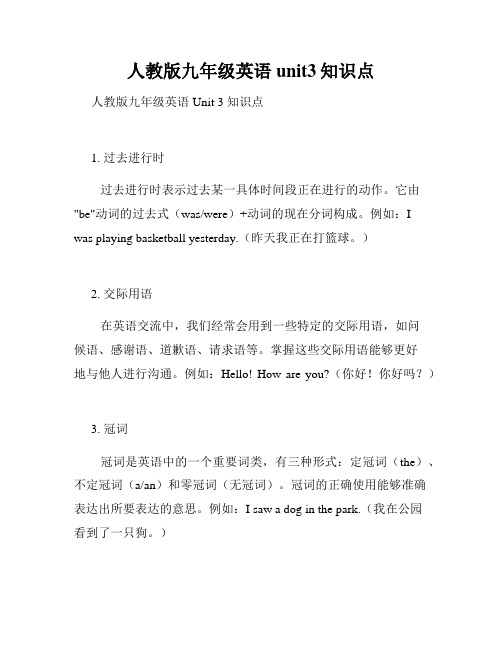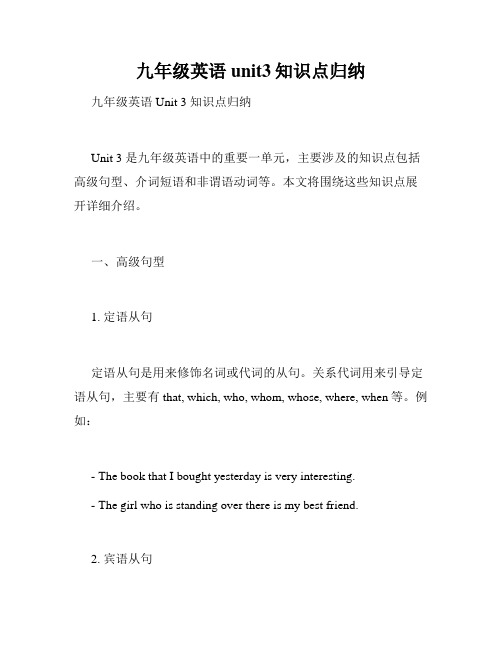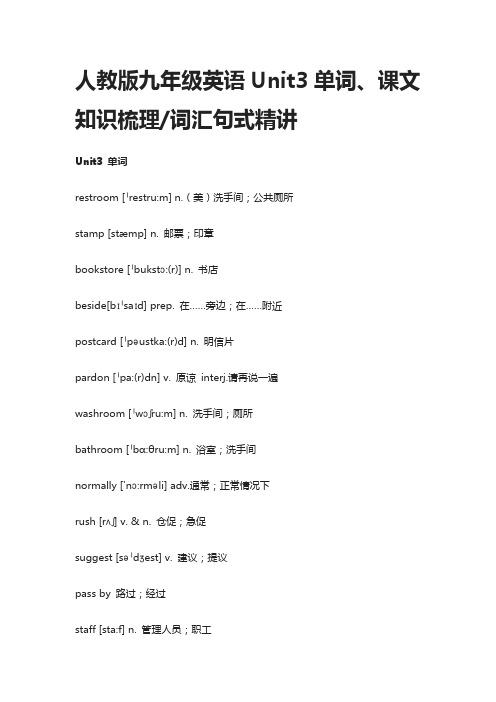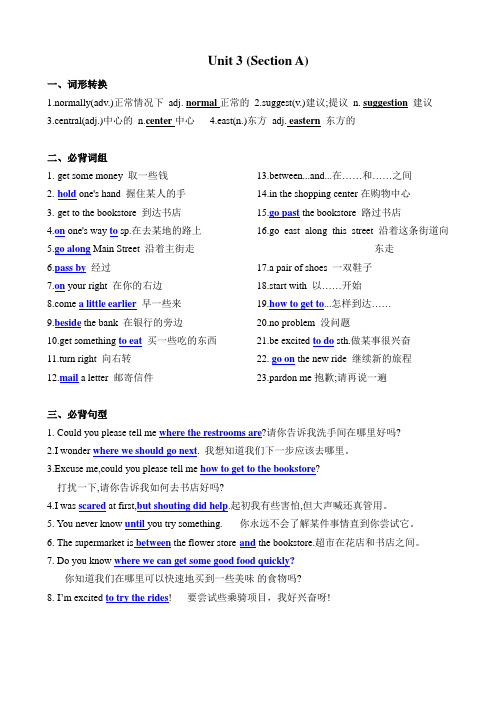九年级英语Unit3
人教版九年级英语unit3知识点

人教版九年级英语unit3知识点人教版九年级英语Unit 3 知识点1. 过去进行时过去进行时表示过去某一具体时间段正在进行的动作。
它由"be"动词的过去式(was/were)+动词的现在分词构成。
例如:I was playing basketball yesterday.(昨天我正在打篮球。
)2. 交际用语在英语交流中,我们经常会用到一些特定的交际用语,如问候语、感谢语、道歉语、请求语等。
掌握这些交际用语能够更好地与他人进行沟通。
例如:Hello! How are you?(你好!你好吗?)3. 冠词冠词是英语中的一个重要词类,有三种形式:定冠词(the)、不定冠词(a/an)和零冠词(无冠词)。
冠词的正确使用能够准确表达出所要表达的意思。
例如:I saw a dog in the park.(我在公园看到了一只狗。
)4. 询问和描述过去经历的表达方式当我们想询问或描述过去的经历时,可以使用一些特定的表达方式。
例如:Have you ever been to Beijing?(你去过北京吗?)Yes, I have been to Beijing before.(是的,我之前去过北京。
)5. 句型转换在英语学习中,我们常常需要进行句型转换,以提高我们的语言运用能力。
例如:I will go to the cinema.(我将去电影院。
)→Will you go to the cinema?(你将去电影院吗?)6. 非谓语动词非谓语动词是一种特殊的动词形式,常见的有不定式、动名词和动词-ing形式。
非谓语动词在句子中可以作主语、宾语、表语或状语等。
例如:Swimming is my favorite sport.(游泳是我最喜欢的运动。
)7. 时态的用法时态是英语中一个重要的语法点,不同的时态可以表示不同的动作发生时间。
如一般现在时表示目前的状态或经常的动作,现在进行时表示正在进行的动作等。
人教版九年级英语Unit-3-知识点总结

Unit 3 知识点总结Unit 3 Could you please tell me where the restrooms are?一、短语总结1. buy some stamps 买一些邮票2. a pair of 一双,一对3. get to the bookstore 到书店4. on one’s right / left 在某人的右边 / 左边5. beside the bank 在银行旁边6. turn right / left 右拐 / 左拐7. between the flower store and the bookstore 在花店和书店之间8. go past the bookstore 经过书店9. be excited to do sth. 对做某事感到兴奋10. try the rides 尝试乘骑项目11. start with ... 以……开始12. need to do sth. 需要做某事13. come on 快点儿14. hold one’s hand抓住某人的手15. at first 首先;最初16. get hungry 饿了17. serve delicious food 提供美味的食物18. on one’s way to ...在某人去……的路上19. pass by 路过;经过20. a rock band 一个摇滚乐队21. walk up to sb. 向某人走去22. come a little earlier 早点儿来23. pardon me 抱歉,对不起;什么,请再说一遍24. mail a letter 寄信25. go east 朝东走26. visit a foreign country 去国外游览27. ask for help politely 礼貌地请求帮助28. sound less polite / impolite 听起来不怎么礼貌 / 不礼貌29. a direct question 一个直接的问题30. in different situations 在不同的情况下31. depend on 取决于32. speak to sb. 和某人说话33. school trip 学校旅行34. such as 诸如35. e-mail address 电子邮箱地址36. lead into a request 导入请求37. spend time (in) doing sth. 花费时间做某事38. trouble sb. 麻烦某人39. communicate better with other people 更好地与他人交流40. an underground parking lot 一个地下停车场41. pass the salt 递一下盐42. change some money 兑换一些钱43. go on a short study vacation 去游学44. an English-speaking country 一个讲英语的国家45. in a rush 急忙地46. on time 按时二、短语用法集合1.not …… until……直到……才……例如:You never know until you try something.2.let’s do sth 咱们做某事吧!3.spend time doing sth 话费时间做某事4.thank sb for doing sth 为做某事而感谢某人5.would like to do sth 想要做某事6.look forward to doing sth 盼望做某事7.It seems (that)…例如:It seems a rock band plays there every evening.8.Could you please tell me... ?例如:Could you please tell me how to get to the post office?9.take的用法① take some food take some medicine (=have吃,喝)② take notes做笔记③ take one’s temperature( 测量)④ It takes sb some time/money to do somet hing (花费,需要)⑤ I’ll take this coat.(=buy购买)⑥ take somebody / something to(带领,拿去,取)⑦ take a train to Chongqing(乘坐)⑧ take off(脱下)10.turn 的用法:① turn to page 80翻到 80 页② It is your turn. 轮到你了。
九年级英语人教版unit3笔记

九年级英语人教版unit3笔记一、重点单词。
1. restroom.- n.(美)洗手间;公共厕所。
例如:I need to find a restroom quickly.(我需要快速找到一个洗手间。
)2. stamp.- n. 邮票;印章。
如:He collects stamps as a hobby.(他把收集邮票当作一种爱好。
)- v. 跺脚;盖章。
例如:She stamped her foot angrily.(她生气地跺了跺脚。
)3. bookstore.- n. 书店。
I bought this book at the bookstore yesterday.(我昨天在这家书店买了这本书。
)4. beside.- prep. 在……旁边;在……附近。
The park is beside the river.(公园在河边。
)5. postcard.- n. 明信片。
He sent me a postcard from Paris.(他从巴黎给我寄了一张明信片。
)6. pardon.- v. 原谅;请再说一遍。
Pardon me, I didn't catch your words.(对不起,我没听清你的话。
)- n. 原谅;宽恕。
I beg your pardon for being late.(请原谅我迟到了。
)7. washroom.- n. 洗手间;厕所(同restroom,比较口语化)。
Can you tell me where the washroom is?(你能告诉我洗手间在哪里吗?)8. bathroom.- n. 浴室;洗手间。
There is a bathtub in the bathroom.(浴室里有一个浴缸。
)9. normal.- adj. 正常的;一般的。
It's normal to feel nervous before an exam.(考试前感到紧张是正常的。
九年级英语unit3知识点归纳

九年级英语unit3知识点归纳九年级英语Unit 3 知识点归纳Unit 3 是九年级英语中的重要一单元,主要涉及的知识点包括高级句型、介词短语和非谓语动词等。
本文将围绕这些知识点展开详细介绍。
一、高级句型1. 定语从句定语从句是用来修饰名词或代词的从句。
关系代词用来引导定语从句,主要有that, which, who, whom, whose, where, when等。
例如:- The book that I bought yesterday is very interesting.- The girl who is standing over there is my best friend.2. 宾语从句宾语从句是在主句中作为宾语的从句。
常用的引导词有that, whether, if等。
例如:- I don't know if it will rain tomorrow.- She asked me whether I had finished my homework.3. 状语从句状语从句是用来修饰主句的副词从句,常用的引导词有when, while, after, before, since, until等。
例如:- He always listens to music while he is doing his homework.- I will call you back as soon as I finish my work.二、介词短语介词短语在句中起着修饰或者指示的作用,可以表达时间、地点、原因、方式等。
常见的介词短语有at, in, on, of, for, with, by等。
例如:- I will meet you at the park tomorrow.- She is good at playing the piano.三、非谓语动词非谓语动词是指在句子中作为非主谓部分的动词形式,包括动词不定式、动名词和现在分词。
九年级英语UNIT3

1.语态:①英语有两种语态:主动语态和补动语态主动语态表示是动作的执行者被动语态表示主语是动作的承受者②被动语态的构成由“助动词be +及物动词的过去分词”构成助动词be 有人称、数和时态的变化,其变化规则与be 作为连系动词时完全一样。
时态被动语态结构例句一般现在时amare +过去分词情态may +be+过去分词③被动语态的用法当我们不知道谁是动作的执行者,或者没有必要指出谁是动作的执行者,或者只需强调动作的承受者时,要用被动语态。
让/使(别人)做某事 get sth. done(过去分词)have sth. done 如:4. enough 足够形容词+enough 如:beautiful enough 足够漂亮enough+名词如:enough food 足够食物enough to 足够…去做…如:i have enough money to go to beijing. 我有足够的钱去北京。
5. stop doing sth. 停止做某事please stop speaking.请停止说话。
stop to do sth. 停止下来去做某事please stop to speak.请停下来说话。
6. 看起来好像…sb. seem to do sth.it seems that +从句he seems to feel very sad.it seems that he feels very sad. 他看起来好像很伤心。
she felt very tired.8. 倒装句:she is a student. so am i. 她是一个学生,我也是。
9. yet 仍然,还常用在否定句或疑问句当中10. stay up 熬夜如:i often stay up until 12:00pm.我经常熬夜到12点。
12. 程度副词:我总是/经常/有时/从不上学迟到。
13. 曾经做某事:16. take the test 参加考试pass the test 通过考试fail a test 考试失败17. the other day 前几天18. agree 同意反义词 disagree不同意动词agreement 同意反义词 disagreement 不同意名词18. keep sb/ sth. +形容词使某人/某物保持…. 如:19. both…and…+动词复数形式如: both jim and li ming play bastketball.20. learn (sth.) from sb. 向谁学习(什么) 如:21. have an opportunity to do sth. 有机会做某事如:i have an opportunity to go to beijing.22. at present 目前23. at least 最少 at most 最多sth. take (sb.) time to do sth. it took (me) 10days to read the book. sb. spend … on sth. she spent 10days on this book.sb. spend …doing sth. she spent 10days reading this book.sb. pay … for sth. she paid 10yuan for this book.25. have +时间段+off 放假,休息如:have 2 days off26. reply to 答复某人如:she replayed to mrgreen.agree to sb. 同意某人的意见如:i agree to lilei.30. think about 与think of 的区别①当两者译为:认为、想起、记着时,两者可互用i often think about/ of that day. 我经常想起那天。
人教版九年级英语Unit3单词、课文知识梳理,词汇句式精讲

人教版九年级英语Unit3单词、课文知识梳理/词汇句式精讲Unit3 单词restroom [ˈrestru:m] n.(美)洗手间;公共厕所stamp [stæmp] n. 邮票;印章bookstore [ˈbukstɔ:(r)] n. 书店beside[bɪˈsaɪd] prep. 在……旁边;在……附近postcard [ˈpəustka:(r)d] n. 明信片pardon [ˈpa:(r)dn] v. 原谅interj.请再说一遍washroom [ˈwɔʃru:m] n. 洗手间;厕所bathroom [ˈbɑ:θru:m] n. 浴室;洗手间normally ['nɔ:rməli] adv.通常;正常情况下rush [rʌʃ] v. & n. 仓促;急促suggest [səˈdʒest] v. 建议;提议pass by 路过;经过staff [sta:f] n. 管理人员;职工grape [greip] n. 葡萄central [ˈsentrəl] adj. 中心的;中央的Nearby [ˌnɪrˈbaɪ] adj.附近的;邻近的adv.在附近;附近Pardon me 抱歉, 对不起;什么,请再说一遍mail [meil] v. 邮寄;发电子邮件n. 邮件east [i:st] adj. 东方的;东部的adv.向东;n.东方fascinating [ˈfæsineitiŋ] adj.迷人的;有吸引力的. Inexpensive[ˌɪnɪkˈspensɪv] adj.不昂贵的Uncrowded [ʌnˈkraʊdɪd] adj.不拥挤的;人少的convenient [kənˈvi:niənt] adj. 便利的;方便的mall [mɔ:l] n. 商场;购物中心clerk [kla:k][kl:rk] n. 职员corner [ˈkɔ:(r)nə(r)] n. 拐角;角落politely [pəˈlaitli] adv. 礼貌地;客气地request [riˈkwest] n. 要求;请求direction [diˈrekʃn] [daiˈrekʃn] n. 方向;方位correct [kəˈrekt] adj. 正确的;恰当的polite [pəˈlait] adj. 有礼貌的;客气的. direct [diˈrekt, daiˈrekt] adj. 直接的;直率的. speaker [ˈspi:kə] n.讲(某种语言)的人;发言者whom [hu:m] pron. 谁;什么人impolite [ˌɪmpəˈlaɪt] adj. 不礼貌的;粗鲁的address [əˈdres], [ˈædres] n.住址;地址;通讯处. Underground [ˈʌndəɡraʊnd] adj.地下的;n.地铁Parking lot n.停车场course [kɔ:(r)s] n. 课程;学科Italian [Iˈtæli ən] adj.意大利\人的;n.意大利人\语Tim [tim] 蒂姆(男名)Unit3 知识梳理【重点短语】1.a pair of 一对,一双,一副2.between A and B 在a和b之间3.on one’s / the way to 在去……的路上4.pardon me 什么,请再说一遍5.pass by 路过经过6.look forward to 盼望期待7.excuse me 打扰了请原谅8.get some information about 获取有关……的一些信息9.turn left\right 向左\向右转10.go past 经过路过11.a little earlier 早一点儿12.a good place to eat 一个吃饭的好地方13.in different situation 在不同的情况下14.on time 准时按时15.get to 到达16.have dinner 吃晚餐17.on one’s / \the right在右边e on 快点请过来19.the shopping center 购物中心20.the corner of....... 的角落/拐角处21.lead into 导入,引入【重点句型】1.问路常用的句子:①Do you know where is …?②Can you tell me how can I get to …?③Could you tell me how to get to …?④Could/Will/Would you please tell me sth.表示十分客气地询问事情Could you tell me how to get to the park?请你告诉我怎么才能去邮局好吗?2. decide to do 决定做…...She decided to go to have lunch. 她决定去吃午餐。
九年级英语_unit3_全单元

•Should we be allowed to wear sunglasses?
•Yes, we should. • Should we be allowed to smoke? • No, we shouldn’t.
Do you think sixteen-year-olds should be allowed to fight with others? No, I don’t.
Listen and check what Kathy thinks. You may circle 2a “Agree”, “Disagree”, or “Doesn’t know” to show what Molly thinks.
Kaห้องสมุดไป่ตู้hy
___1. Sixteen-year-olds should √ not be allowed work at night. ___2. Larry shouldn’t work √ every night.
She gets her hair dyed. • Are you allowed to get your hair dyed? She wears a mini skirt. •Are you allowed to wear a mini skirt? •Are you allowed to choose your own clothes?
Let’s talk about what you are allowed to do.
•1. Don’t arrive late for class. •2. Don’t run in the hallways. •3. Don’t eat in the classroom. •4. Don’t listen to music in the classrooms or the hallways.
九年级英语Unit3笔记

Unit 3 (Section A)一、词形转换1.normally(adv.)正常情况下adj. normal正常的2.suggest(v.)建议;提议n. suggestion建议3.central(adj.)中心的n.center中心4.east(n.)东方adj. eastern东方的二、必背词组1.get some money 取一些钱2.hold one's hand 握住某人的手3.get to the bookstore 到达书店4.on one's way to sp.在去某地的路上5.go along Main Street 沿着主街走6.pass by经过7.on your right 在你的右边e a little earlier早一些来9.beside the bank 在银行的旁边10.get something to eat买一些吃的东西11.turn right 向右转12.mail a letter 邮寄信件13.between...and...在……和……之间14.in the shopping center在购物中心15.go past the bookstore 路过书店16.go east along this street沿着这条街道向东走17.a pair of shoes 一双鞋子18.start with 以……开始19.how to get to...怎样到达……20.no problem 没问题21.be excited to do sth.做某事很兴奋22. go on the new ride 继续新的旅程23.pardon me抱歉;请再说一遍三、必背句型1. Could you please tell me where the restrooms are?请你告诉我洗手间在哪里好吗?2.I wonder where we should go next. 我想知道我们下一步应该去哪里。
- 1、下载文档前请自行甄别文档内容的完整性,平台不提供额外的编辑、内容补充、找答案等附加服务。
- 2、"仅部分预览"的文档,不可在线预览部分如存在完整性等问题,可反馈申请退款(可完整预览的文档不适用该条件!)。
- 3、如文档侵犯您的权益,请联系客服反馈,我们会尽快为您处理(人工客服工作时间:9:00-18:30)。
第一部分教材梳理第3讲九年级(上)Unit 3基础巩固必记词汇:英汉词语互译1. 粘住,木棍_______2. 相似的_______3. 交谈______ 4 公司______ 5. 无论何时_______ 6.舌头______ 7. 会议_______ 8. 地位_______ 9. 差异_______ 10. 胜利______11. 发音_______ 12. 困倦的______13.日记14.牙膏______15.完整的_______16.besides ___ 17. insist_______18.method ______19.discussion _______20.aloud 21.review 22.force 23.peonunciation24.state 25.general municate nguage28.translate 29.spoken 30.wise答案:1.stick 2.similar 3.conversation pany 5.whenever 6.tongue 7. conference 8.position9.difference 10.victory 11.pronounce 12.sleepy 13.diary 14.toothpaste plete 16.除。
以外17.坚持18.方法19.讨论20. 大声地21.复习22.强迫23.发音24.国家,州25.大体的26.交流,传达27.语言28.翻译29. 口语的30.明智的重点短语:英汉短语互译1.坚持…/ 做某事2.为……准备(好)3. 等候,等待4. 迫不及待做某事5.练习做某事.6.从现在起7.遍及全世界8. 尽…最大努力(做某事)9. 满意…,对…满意10出差;做生意11. be similar to 12.not really13.have no/some trouble (in) doing sth. 14. have long conversations with…15.ask sb for help 16. translate ---into--- 17.in general = Generally speaking, 18.make mistskes 19.feel like doing…20.see sb.off答案:1. stick to sth / doing sth 2. be ready for 3. wait for 4. can’t wait to do sth.5. practice doing sth.6. from now on7. throughout the world = all over the world = around the world8. try on e’s best (to do sth )= do on e’s best (to do sth)9. be pleased with…10. on business 11. 与……相似12. 不全是,事实上没有13. 做某事没有/有些困难14. 有长的对话15.向某人求助16. 把…翻译成…17. 通常地,大体上说18.犯错误19. 想要…;感觉要…20. 为某人送行重点句型:英汉句型互译1. I hope I can go there one day.2. English is widely spoken around the world.3. It is possible that you will have some trouble.4. And two thirds of the world’s scientists read English.5. Not only children but also adults enjoy spending their holidays in Disneyland.6.在美国,别人能懂得你的话吗?7.我不知道该怎么办?8.有时我想要放弃。
9.我坚持认为你们每天都应该练习英语。
10. 自信是通往成功的第一步。
答案:1.希望有一天我能去那儿。
2. 英语在世界上被广泛使用。
3. 你可能会遇到一些麻烦。
4.并且世界上三分之二的科学家用英语阅读。
5. 不但青少年而且成年人也喜欢到迪斯尼乐园度假。
6. Could you make yourself understood in the U.S.A?7. I don’t know what to do.8. At times I feel like giving up.9.I insist that you practice English every day.10. Believing in yourself is the first step on the road to success.名师导学考点解读考点1. Disneyland is enjoyed by millions of people from all over the world.世界上许许多多的人都喜欢迪斯尼乐园。
is enjoyed表示“被喜欢”,是一般现在时的被动语态。
被动语态表示主语是谓语动词的承受着,其结构是“be+及物动词的过去分词”例如:Paper is made from wood. 纸是木头制成的。
【演练】1.This factory produces machine tools.→Machine tools in this factory.2. Many people speak Chinese.→Chinese many people. 答案:1. are produced 2. is spoken by考点2.You’ll have a good chance to practice speaking. 在那儿你将有一个练习说英语的好机会。
Practice(practise)+doing sth. 练习做某事。
例如:John is practicing playing the violin.约翰在练习拉小提琴。
【拓展】常见动词后,只能接动名词作宾语的动词有:admit, consider, delay, enjoy, finish, keep, imagine, mind, miss, practice, resist, suggest, mind, give up等。
如:I suggest spending our summer vacation in a seaside town.You must give up smoking, for it does too much harm to your health.Do you enjoy reading?【演练】用所给词的正确形式填空1.Are you enjoying ______ (live)on the fifth floor?2.After he finished ______ (write),he had a good rest.3.Shall we go ______ (boat)?4.We are all interested in ______ (play)games.答案:1. living 2.writing 3. boating 4. playing考点3. My friends told me to put my suitcase in the boot.我的朋友们告诉我把我的小提箱放在行李箱了。
Tell sb.(not)to do sth. 告诉某人(不要)做某事【拓展】常要求不定式作宾补的动词有:allow, ask, advise, beg, cause,,encourage, expect, forbid, force, get, would like(love, hate), order, permit, persuade, teach, tell, want, warn, wish等。
如:I want you to understand the whole passage clearly.My teacher always encourages me to work hard. 我的老师一直鼓励我努力学习。
【演练】选择填空。
1. You are so busy. What do you want me_________ for you?A. doB. doneC. to do2. Alice asked me _________ another bag for her.A. getB. gotC. to get3. Jane likes singing. We often hear her_________ after class.A. singB. to singC. sings4. —Mr Wang, I have trouble _________ the text.—Remember _________ it three times at least.A. to understand; readingB. understanding; readingC. understanding; to read5. The teacher told the students _________ in class.A. not to talkB. no talkC. not talk答案:1—5 CCACA考点4。
I don’t know whether I should join an English club.我不知道我是否应该加入英语俱乐部。
whether引导的从句为宾语从句,当然此处也可用if 引导。
【拓展】一、if或whether引导宾语从句时,作“是否”讲,常放在动词ask 、see 、say 、know和find out等后面。
一般情况下,两者常可换用,在口语中多用if。
如:Nobody knows whether (if) it will rain tomorrow. 没有人知道明天是否下雨。
Lucy asked whether (if) they had a cotton sweater .露西问他们是否有棉制的羊毛衣。
二、if或whether引导宾语从句时,要注意三个方面,即连词、语序和时态。
1.if或whether不能和that 或其它连词(副词)同时使用,也不能省去。
如:我不知道他今天是否会来。
I don’t know that if(whether) he will come here today .(误)I don’t know if(whether) he will come here today .(正)2 .if或whether引导的宾语从句时,虽具有疑问意义,但从句语序应用陈述句语序。
